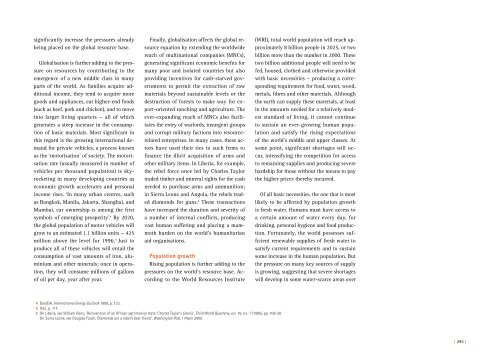RESOURCE COMPETITION IN THE 21ST CENTURY
RESOURCE COMPETITION IN THE 21ST CENTURY
RESOURCE COMPETITION IN THE 21ST CENTURY
Create successful ePaper yourself
Turn your PDF publications into a flip-book with our unique Google optimized e-Paper software.
significantly increase the pressures alreadybeing placed on the global resource base.Globalisation is further adding to the pressureon resources by contributing to theemergence of a new middle class in manyparts of the world. As families acquire additionalincome, they tend to acquire moregoods and appliances, eat higher-end foods(such as beef, pork and chicken), and to moveinto larger living quarters — all of whichgenerates a steep increase in the consumptionof basic materials. Most significant inthis regard is the growing international demandfor private vehicles, a process knownas the ‘motorisation’ of society. The motorisationrate (usually measured in number ofvehicles per thousand population) is skyrocketingin many developing countries aseconomic growth accelerates and personalincome rises. ‘In many urban centres, suchas Bangkok, Manila, Jakarta, Shanghai, andMumbai, car ownership is among the firstsymbols of emerging prosperity’. 4 By 2020,the global population of motor vehicles willgrow to an estimated 1.1 billion units — 425million above the level for 1996. 5 Just toproduce all of these vehicles will entail theconsumption of vast amounts of iron, aluminiumand other minerals; once in operation,they will consume millions of gallonsof oil per day, year after year.Finally, globalisation affects the global resourceequation by extending the worldwidereach of multinational companies (MNCs),generating significant economic benefits formany poor and isolated countries but alsoproviding incentives for cash-starved governmentsto permit the extraction of rawmaterials beyond sustainable levels or thedestruction of forests to make way for export-orientedranching and agriculture. Theever-expanding reach of MNCs also facilitatesthe entry of warlords, insurgent groupsand corrupt military factions into resourcerelatedenterprises. In many cases, these actorshave used their ties to such firms tofinance the illicit acquisition of arms andother military items. In Liberia, for example,the rebel force once led by Charles Taylortraded timber and mineral rights for the cashneeded to purchase arms and ammunition;in Sierra Leone and Angola, the rebels tradeddiamonds for guns. 6 These transactionshave increased the duration and severity ofa number of internal conflicts, producingvast human suffering and placing a mammothburden on the world’s humanitarianaid organisations.Population growthRising population is further adding to thepressures on the world’s resource base. Accordingto the World Resources Institute(WRI), total world population will reach approximately8 billion people in 2025, or twobillion more than the number in 2000. Thesetwo billion additional people will need to befed, housed, clothed and otherwise providedwith basic necessities — producing a correspondingrequirement for food, water, wood,metals, fibres and other materials. Althoughthe earth can supply these materials, at leastin the amounts needed for a relatively modeststandard of living, it cannot continueto sustain an ever-growing human populationand satisfy the rising expectationsof the world’s middle and upper classes. Atsome point, significant shortages will occur,intensifying the competition for accessto remaining supplies and producing severehardship for those without the means to paythe higher prices thereby incurred.Of all basic necessities, the one that is mostlikely to be affected by population growthis fresh water. Humans must have access toa certain amount of water every day, fordrinking, personal hygiene and food production.Fortunately, the world possesses sufficientrenewable supplies of fresh water tosatisfy current requirements and to sustainsome increase in the human population. Butthe pressure on many key sources of supplyis growing, suggesting that severe shortageswill develop in some water-scarce areas over4 Doe/EIA, International Energy Outlook 1999, p. 133.5 Ibid., p. 117.6 On Liberia, see William Reno, ‘Reinvention of an African patrimonial state: Charles Taylor’s Liberia’, Third World Quarterly, vol. 16, no. 1 (1995), pp. 109-20.On Sierra Leone, see Douglas Farah, ‘Diamonds are a rebel’s best friend’, Washington Post, 17April 2000.[ 295 ]
















